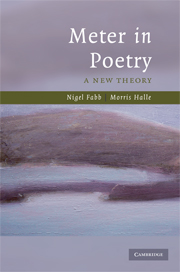8 - Sanskrit
Published online by Cambridge University Press: 06 July 2010
Summary
The Vedic meters
The collection of hymns in Vedic Sanskrit called the Rig-veda were composed about three and a half thousand years ago, and for a long period were transmitted orally. The hymns are in 3-line, 4-line, or 5-line stanzas, and in quantitative meters (like Greek, based on patterns of heavy and light syllables). The meters can be divided into those with a short line of 8 syllables, and those with a long line of 11 or 12 syllables; there is also a rarer 5-syllable line. In the long-line meters there is a caesura after either the fourth syllable (‘early caesura’) or the fifth syllable (‘late caesura’). We will show that the Vedic meters share iterative rules, and differ by small variations in deletion rules and conditions.
Though they are the oldest metrical texts to have survived, there is nothing ‘primitive’ about the metrical form of the Vedic hymns: the iterative rules and deletion rules found here are basically the same kinds of rule as we find in all metrical poetry. Like language itself, both the possibility and the nature of metrical poetry arise from our being human, and do not appear to have changed significantly during recorded history. The fact that the oldest metrical texts to have survived are only three and a half thousand years old tells us nothing about how long humans have been composing metrical poetry.
- Type
- Chapter
- Information
- Meter in PoetryA New Theory, pp. 214 - 237Publisher: Cambridge University PressPrint publication year: 2008



